BUS707 - Applied Business Research: Structured Literature Review
VerifiedAdded on 2022/11/18
|6
|1572
|264
Report
AI Summary
This report presents a structured literature review focusing on the application of artificial intelligence (AI) in auditing and accounting, based on four academic articles. The review explores how AI impacts auditing processes, highlighting common themes such as enhanced efficiency, accuracy, and the potential for robotic process automation (RPA) to disrupt manual systems. The analysis also identifies different themes across the articles, including varying perspectives on the role of human resources and the potential for bias in AI implementation. Managerial implications discussed include the benefits of AI in improving accuracy, reducing auditor workload, and promoting transparency. The review also addresses research limitations, such as the need for further investigation into AI tools and data provenance, while recommending future research to explore challenges and transparency in AI implementation within accounting departments. The report provides a comprehensive overview of the current research landscape, offering valuable insights for professionals and researchers in the field.
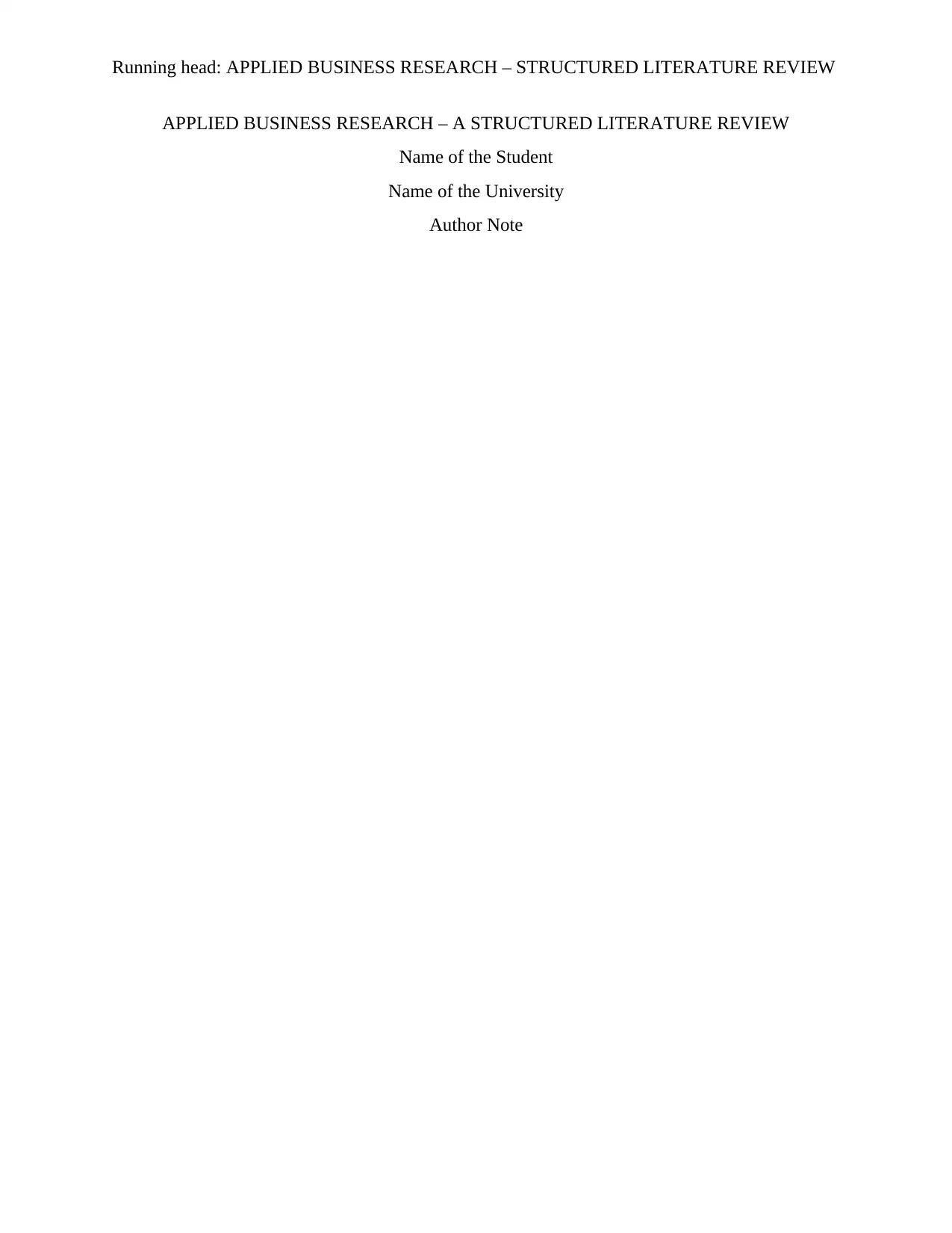
Running head: APPLIED BUSINESS RESEARCH – STRUCTURED LITERATURE REVIEW
APPLIED BUSINESS RESEARCH – A STRUCTURED LITERATURE REVIEW
Name of the Student
Name of the University
Author Note
APPLIED BUSINESS RESEARCH – A STRUCTURED LITERATURE REVIEW
Name of the Student
Name of the University
Author Note
Paraphrase This Document
Need a fresh take? Get an instant paraphrase of this document with our AI Paraphraser
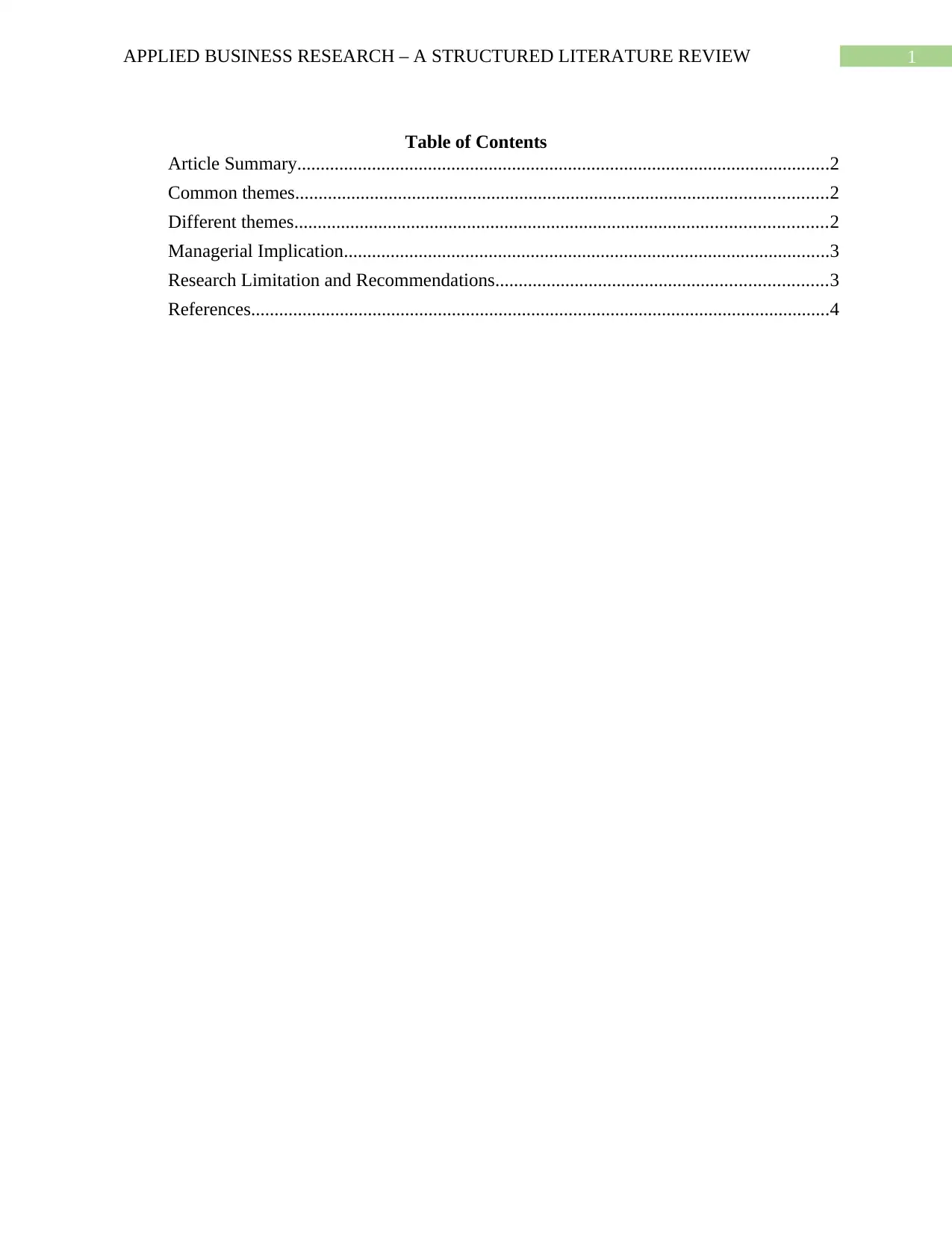
1APPLIED BUSINESS RESEARCH – A STRUCTURED LITERATURE REVIEW
Table of Contents
Article Summary..................................................................................................................2
Common themes..................................................................................................................2
Different themes..................................................................................................................2
Managerial Implication........................................................................................................3
Research Limitation and Recommendations.......................................................................3
References............................................................................................................................4
Table of Contents
Article Summary..................................................................................................................2
Common themes..................................................................................................................2
Different themes..................................................................................................................2
Managerial Implication........................................................................................................3
Research Limitation and Recommendations.......................................................................3
References............................................................................................................................4
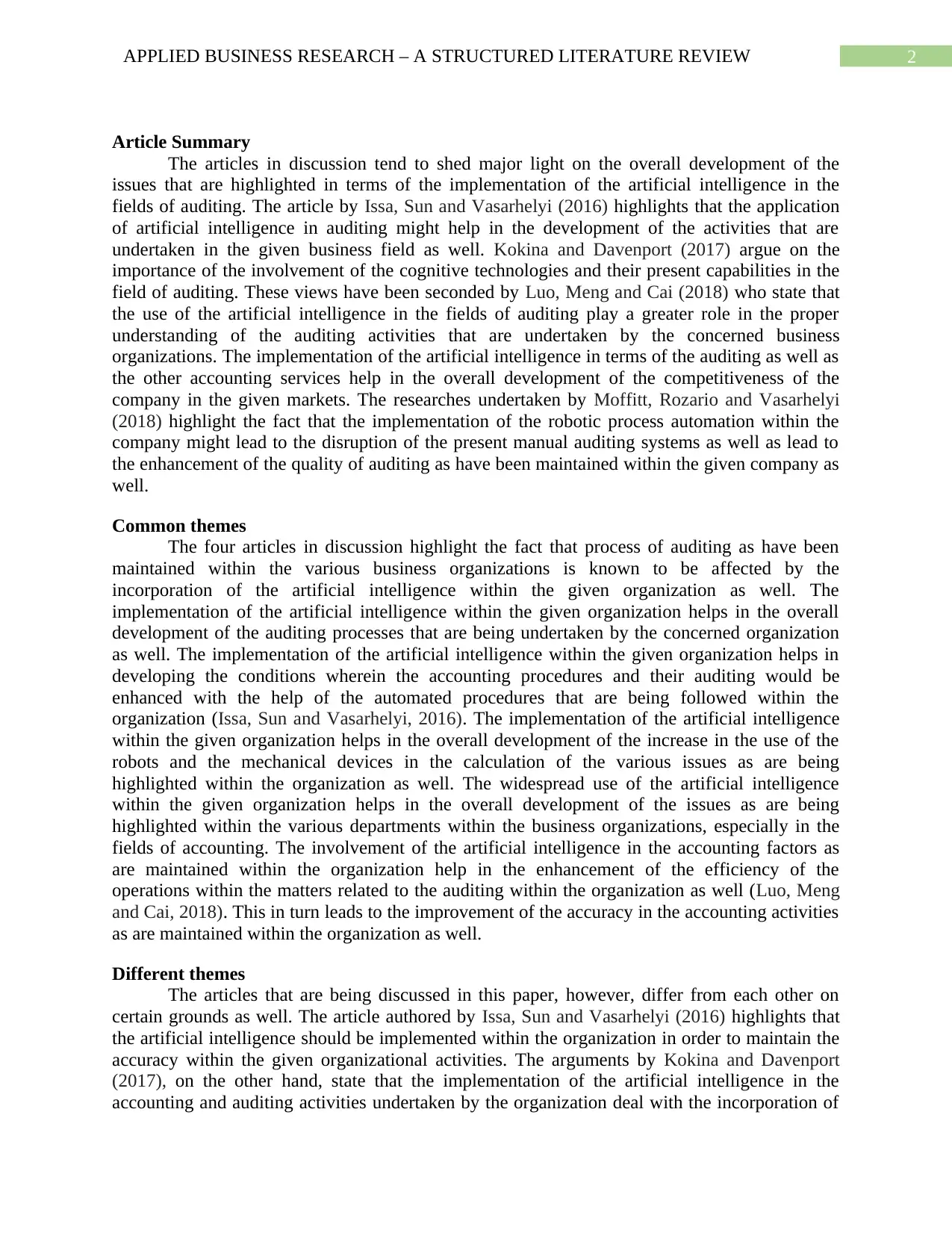
2APPLIED BUSINESS RESEARCH – A STRUCTURED LITERATURE REVIEW
Article Summary
The articles in discussion tend to shed major light on the overall development of the
issues that are highlighted in terms of the implementation of the artificial intelligence in the
fields of auditing. The article by Issa, Sun and Vasarhelyi (2016) highlights that the application
of artificial intelligence in auditing might help in the development of the activities that are
undertaken in the given business field as well. Kokina and Davenport (2017) argue on the
importance of the involvement of the cognitive technologies and their present capabilities in the
field of auditing. These views have been seconded by Luo, Meng and Cai (2018) who state that
the use of the artificial intelligence in the fields of auditing play a greater role in the proper
understanding of the auditing activities that are undertaken by the concerned business
organizations. The implementation of the artificial intelligence in terms of the auditing as well as
the other accounting services help in the overall development of the competitiveness of the
company in the given markets. The researches undertaken by Moffitt, Rozario and Vasarhelyi
(2018) highlight the fact that the implementation of the robotic process automation within the
company might lead to the disruption of the present manual auditing systems as well as lead to
the enhancement of the quality of auditing as have been maintained within the given company as
well.
Common themes
The four articles in discussion highlight the fact that process of auditing as have been
maintained within the various business organizations is known to be affected by the
incorporation of the artificial intelligence within the given organization as well. The
implementation of the artificial intelligence within the given organization helps in the overall
development of the auditing processes that are being undertaken by the concerned organization
as well. The implementation of the artificial intelligence within the given organization helps in
developing the conditions wherein the accounting procedures and their auditing would be
enhanced with the help of the automated procedures that are being followed within the
organization (Issa, Sun and Vasarhelyi, 2016). The implementation of the artificial intelligence
within the given organization helps in the overall development of the increase in the use of the
robots and the mechanical devices in the calculation of the various issues as are being
highlighted within the organization as well. The widespread use of the artificial intelligence
within the given organization helps in the overall development of the issues as are being
highlighted within the various departments within the business organizations, especially in the
fields of accounting. The involvement of the artificial intelligence in the accounting factors as
are maintained within the organization help in the enhancement of the efficiency of the
operations within the matters related to the auditing within the organization as well (Luo, Meng
and Cai, 2018). This in turn leads to the improvement of the accuracy in the accounting activities
as are maintained within the organization as well.
Different themes
The articles that are being discussed in this paper, however, differ from each other on
certain grounds as well. The article authored by Issa, Sun and Vasarhelyi (2016) highlights that
the artificial intelligence should be implemented within the organization in order to maintain the
accuracy within the given organizational activities. The arguments by Kokina and Davenport
(2017), on the other hand, state that the implementation of the artificial intelligence in the
accounting and auditing activities undertaken by the organization deal with the incorporation of
Article Summary
The articles in discussion tend to shed major light on the overall development of the
issues that are highlighted in terms of the implementation of the artificial intelligence in the
fields of auditing. The article by Issa, Sun and Vasarhelyi (2016) highlights that the application
of artificial intelligence in auditing might help in the development of the activities that are
undertaken in the given business field as well. Kokina and Davenport (2017) argue on the
importance of the involvement of the cognitive technologies and their present capabilities in the
field of auditing. These views have been seconded by Luo, Meng and Cai (2018) who state that
the use of the artificial intelligence in the fields of auditing play a greater role in the proper
understanding of the auditing activities that are undertaken by the concerned business
organizations. The implementation of the artificial intelligence in terms of the auditing as well as
the other accounting services help in the overall development of the competitiveness of the
company in the given markets. The researches undertaken by Moffitt, Rozario and Vasarhelyi
(2018) highlight the fact that the implementation of the robotic process automation within the
company might lead to the disruption of the present manual auditing systems as well as lead to
the enhancement of the quality of auditing as have been maintained within the given company as
well.
Common themes
The four articles in discussion highlight the fact that process of auditing as have been
maintained within the various business organizations is known to be affected by the
incorporation of the artificial intelligence within the given organization as well. The
implementation of the artificial intelligence within the given organization helps in the overall
development of the auditing processes that are being undertaken by the concerned organization
as well. The implementation of the artificial intelligence within the given organization helps in
developing the conditions wherein the accounting procedures and their auditing would be
enhanced with the help of the automated procedures that are being followed within the
organization (Issa, Sun and Vasarhelyi, 2016). The implementation of the artificial intelligence
within the given organization helps in the overall development of the increase in the use of the
robots and the mechanical devices in the calculation of the various issues as are being
highlighted within the organization as well. The widespread use of the artificial intelligence
within the given organization helps in the overall development of the issues as are being
highlighted within the various departments within the business organizations, especially in the
fields of accounting. The involvement of the artificial intelligence in the accounting factors as
are maintained within the organization help in the enhancement of the efficiency of the
operations within the matters related to the auditing within the organization as well (Luo, Meng
and Cai, 2018). This in turn leads to the improvement of the accuracy in the accounting activities
as are maintained within the organization as well.
Different themes
The articles that are being discussed in this paper, however, differ from each other on
certain grounds as well. The article authored by Issa, Sun and Vasarhelyi (2016) highlights that
the artificial intelligence should be implemented within the organization in order to maintain the
accuracy within the given organizational activities. The arguments by Kokina and Davenport
(2017), on the other hand, state that the implementation of the artificial intelligence in the
accounting and auditing activities undertaken by the organization deal with the incorporation of
⊘ This is a preview!⊘
Do you want full access?
Subscribe today to unlock all pages.

Trusted by 1+ million students worldwide
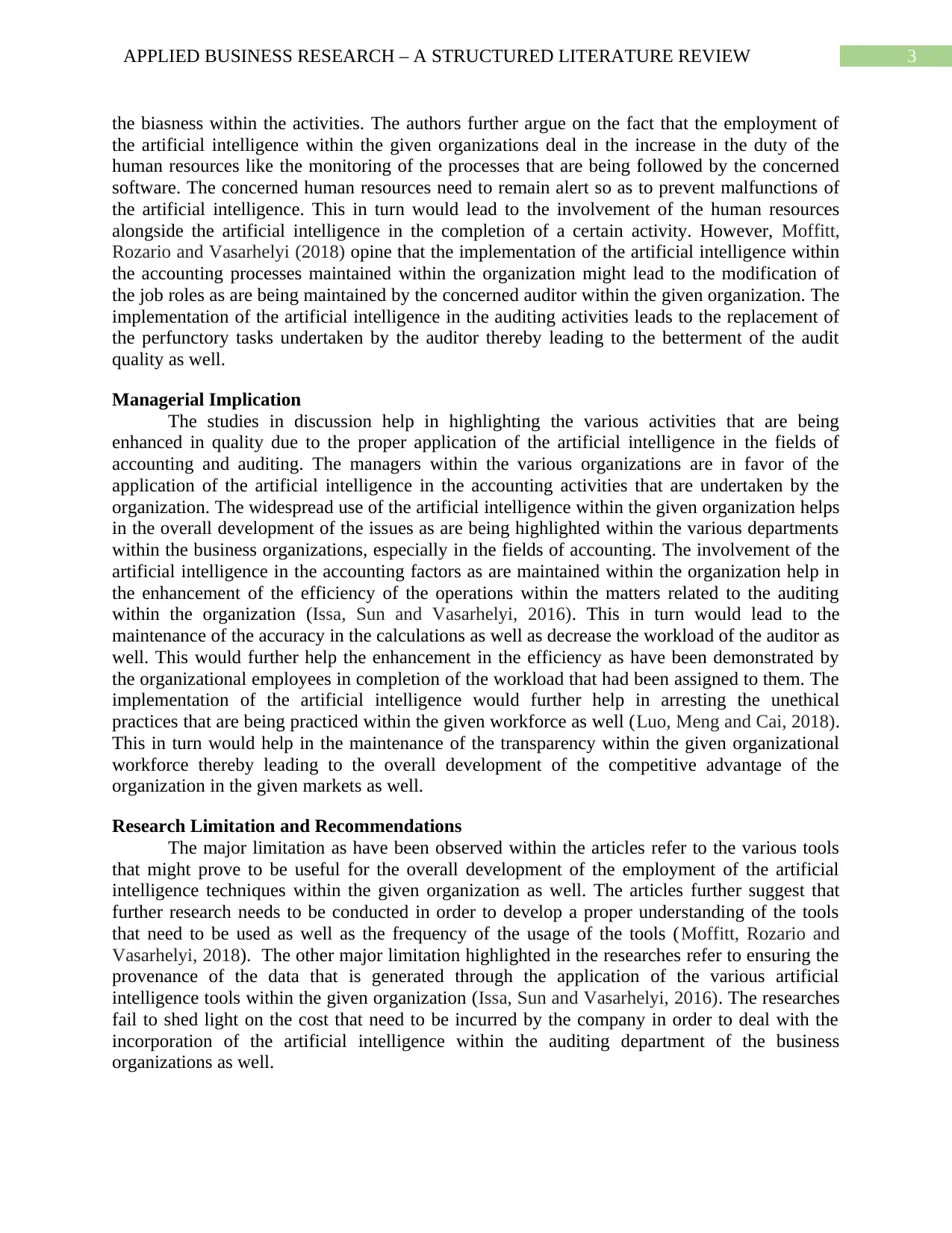
3APPLIED BUSINESS RESEARCH – A STRUCTURED LITERATURE REVIEW
the biasness within the activities. The authors further argue on the fact that the employment of
the artificial intelligence within the given organizations deal in the increase in the duty of the
human resources like the monitoring of the processes that are being followed by the concerned
software. The concerned human resources need to remain alert so as to prevent malfunctions of
the artificial intelligence. This in turn would lead to the involvement of the human resources
alongside the artificial intelligence in the completion of a certain activity. However, Moffitt,
Rozario and Vasarhelyi (2018) opine that the implementation of the artificial intelligence within
the accounting processes maintained within the organization might lead to the modification of
the job roles as are being maintained by the concerned auditor within the given organization. The
implementation of the artificial intelligence in the auditing activities leads to the replacement of
the perfunctory tasks undertaken by the auditor thereby leading to the betterment of the audit
quality as well.
Managerial Implication
The studies in discussion help in highlighting the various activities that are being
enhanced in quality due to the proper application of the artificial intelligence in the fields of
accounting and auditing. The managers within the various organizations are in favor of the
application of the artificial intelligence in the accounting activities that are undertaken by the
organization. The widespread use of the artificial intelligence within the given organization helps
in the overall development of the issues as are being highlighted within the various departments
within the business organizations, especially in the fields of accounting. The involvement of the
artificial intelligence in the accounting factors as are maintained within the organization help in
the enhancement of the efficiency of the operations within the matters related to the auditing
within the organization (Issa, Sun and Vasarhelyi, 2016). This in turn would lead to the
maintenance of the accuracy in the calculations as well as decrease the workload of the auditor as
well. This would further help the enhancement in the efficiency as have been demonstrated by
the organizational employees in completion of the workload that had been assigned to them. The
implementation of the artificial intelligence would further help in arresting the unethical
practices that are being practiced within the given workforce as well (Luo, Meng and Cai, 2018).
This in turn would help in the maintenance of the transparency within the given organizational
workforce thereby leading to the overall development of the competitive advantage of the
organization in the given markets as well.
Research Limitation and Recommendations
The major limitation as have been observed within the articles refer to the various tools
that might prove to be useful for the overall development of the employment of the artificial
intelligence techniques within the given organization as well. The articles further suggest that
further research needs to be conducted in order to develop a proper understanding of the tools
that need to be used as well as the frequency of the usage of the tools (Moffitt, Rozario and
Vasarhelyi, 2018). The other major limitation highlighted in the researches refer to ensuring the
provenance of the data that is generated through the application of the various artificial
intelligence tools within the given organization (Issa, Sun and Vasarhelyi, 2016). The researches
fail to shed light on the cost that need to be incurred by the company in order to deal with the
incorporation of the artificial intelligence within the auditing department of the business
organizations as well.
the biasness within the activities. The authors further argue on the fact that the employment of
the artificial intelligence within the given organizations deal in the increase in the duty of the
human resources like the monitoring of the processes that are being followed by the concerned
software. The concerned human resources need to remain alert so as to prevent malfunctions of
the artificial intelligence. This in turn would lead to the involvement of the human resources
alongside the artificial intelligence in the completion of a certain activity. However, Moffitt,
Rozario and Vasarhelyi (2018) opine that the implementation of the artificial intelligence within
the accounting processes maintained within the organization might lead to the modification of
the job roles as are being maintained by the concerned auditor within the given organization. The
implementation of the artificial intelligence in the auditing activities leads to the replacement of
the perfunctory tasks undertaken by the auditor thereby leading to the betterment of the audit
quality as well.
Managerial Implication
The studies in discussion help in highlighting the various activities that are being
enhanced in quality due to the proper application of the artificial intelligence in the fields of
accounting and auditing. The managers within the various organizations are in favor of the
application of the artificial intelligence in the accounting activities that are undertaken by the
organization. The widespread use of the artificial intelligence within the given organization helps
in the overall development of the issues as are being highlighted within the various departments
within the business organizations, especially in the fields of accounting. The involvement of the
artificial intelligence in the accounting factors as are maintained within the organization help in
the enhancement of the efficiency of the operations within the matters related to the auditing
within the organization (Issa, Sun and Vasarhelyi, 2016). This in turn would lead to the
maintenance of the accuracy in the calculations as well as decrease the workload of the auditor as
well. This would further help the enhancement in the efficiency as have been demonstrated by
the organizational employees in completion of the workload that had been assigned to them. The
implementation of the artificial intelligence would further help in arresting the unethical
practices that are being practiced within the given workforce as well (Luo, Meng and Cai, 2018).
This in turn would help in the maintenance of the transparency within the given organizational
workforce thereby leading to the overall development of the competitive advantage of the
organization in the given markets as well.
Research Limitation and Recommendations
The major limitation as have been observed within the articles refer to the various tools
that might prove to be useful for the overall development of the employment of the artificial
intelligence techniques within the given organization as well. The articles further suggest that
further research needs to be conducted in order to develop a proper understanding of the tools
that need to be used as well as the frequency of the usage of the tools (Moffitt, Rozario and
Vasarhelyi, 2018). The other major limitation highlighted in the researches refer to ensuring the
provenance of the data that is generated through the application of the various artificial
intelligence tools within the given organization (Issa, Sun and Vasarhelyi, 2016). The researches
fail to shed light on the cost that need to be incurred by the company in order to deal with the
incorporation of the artificial intelligence within the auditing department of the business
organizations as well.
Paraphrase This Document
Need a fresh take? Get an instant paraphrase of this document with our AI Paraphraser
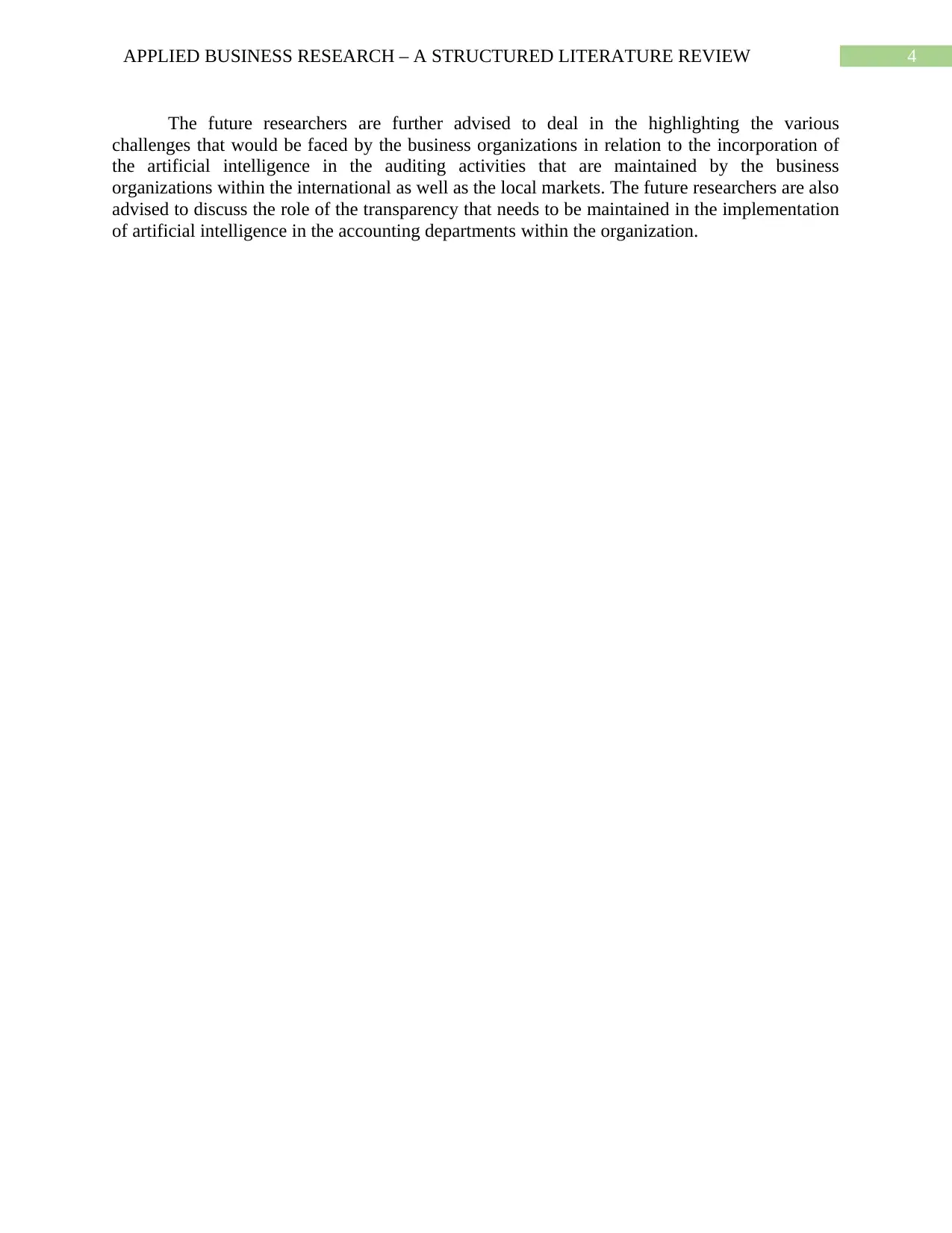
4APPLIED BUSINESS RESEARCH – A STRUCTURED LITERATURE REVIEW
The future researchers are further advised to deal in the highlighting the various
challenges that would be faced by the business organizations in relation to the incorporation of
the artificial intelligence in the auditing activities that are maintained by the business
organizations within the international as well as the local markets. The future researchers are also
advised to discuss the role of the transparency that needs to be maintained in the implementation
of artificial intelligence in the accounting departments within the organization.
The future researchers are further advised to deal in the highlighting the various
challenges that would be faced by the business organizations in relation to the incorporation of
the artificial intelligence in the auditing activities that are maintained by the business
organizations within the international as well as the local markets. The future researchers are also
advised to discuss the role of the transparency that needs to be maintained in the implementation
of artificial intelligence in the accounting departments within the organization.
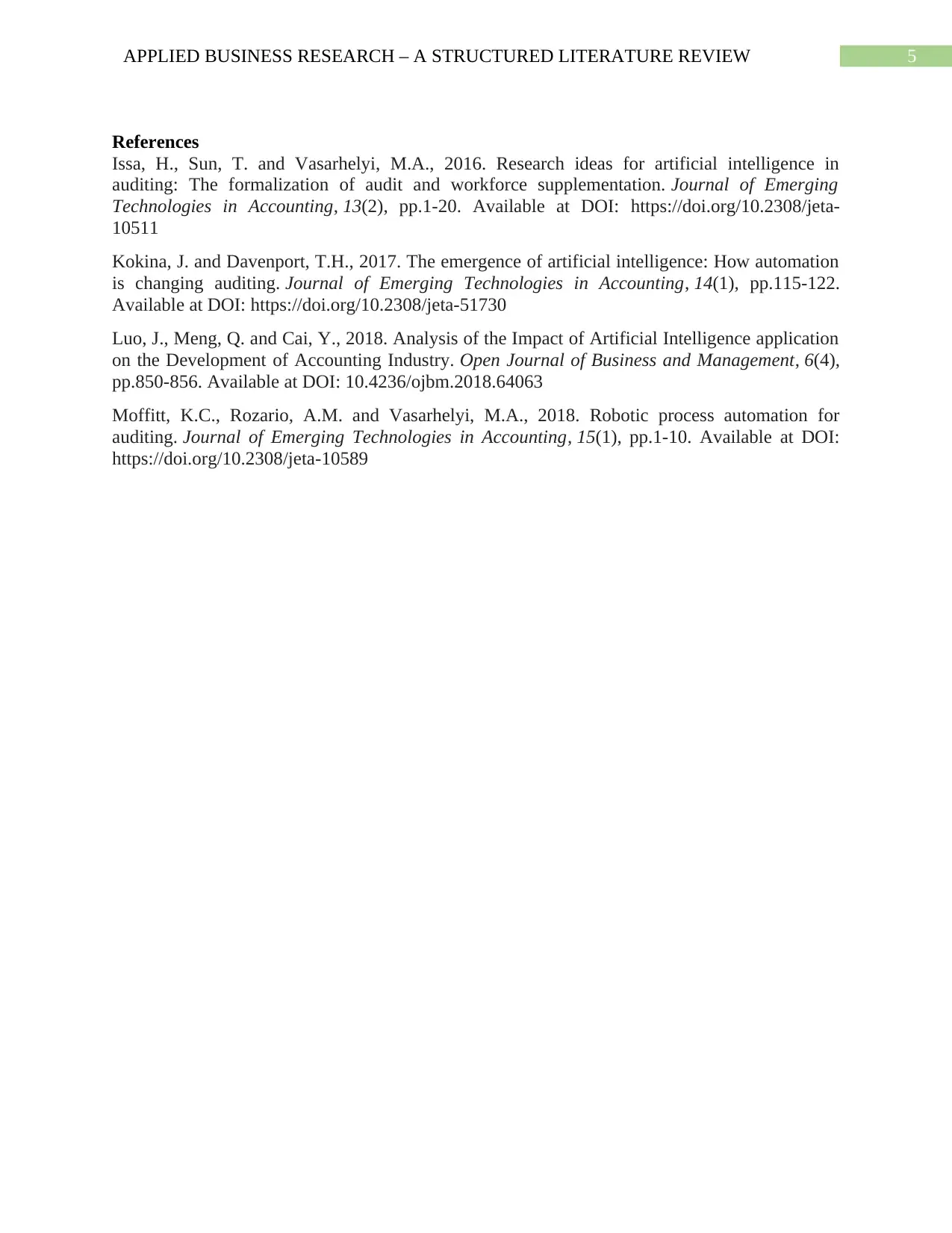
5APPLIED BUSINESS RESEARCH – A STRUCTURED LITERATURE REVIEW
References
Issa, H., Sun, T. and Vasarhelyi, M.A., 2016. Research ideas for artificial intelligence in
auditing: The formalization of audit and workforce supplementation. Journal of Emerging
Technologies in Accounting, 13(2), pp.1-20. Available at DOI: https://doi.org/10.2308/jeta-
10511
Kokina, J. and Davenport, T.H., 2017. The emergence of artificial intelligence: How automation
is changing auditing. Journal of Emerging Technologies in Accounting, 14(1), pp.115-122.
Available at DOI: https://doi.org/10.2308/jeta-51730
Luo, J., Meng, Q. and Cai, Y., 2018. Analysis of the Impact of Artificial Intelligence application
on the Development of Accounting Industry. Open Journal of Business and Management, 6(4),
pp.850-856. Available at DOI: 10.4236/ojbm.2018.64063
Moffitt, K.C., Rozario, A.M. and Vasarhelyi, M.A., 2018. Robotic process automation for
auditing. Journal of Emerging Technologies in Accounting, 15(1), pp.1-10. Available at DOI:
https://doi.org/10.2308/jeta-10589
References
Issa, H., Sun, T. and Vasarhelyi, M.A., 2016. Research ideas for artificial intelligence in
auditing: The formalization of audit and workforce supplementation. Journal of Emerging
Technologies in Accounting, 13(2), pp.1-20. Available at DOI: https://doi.org/10.2308/jeta-
10511
Kokina, J. and Davenport, T.H., 2017. The emergence of artificial intelligence: How automation
is changing auditing. Journal of Emerging Technologies in Accounting, 14(1), pp.115-122.
Available at DOI: https://doi.org/10.2308/jeta-51730
Luo, J., Meng, Q. and Cai, Y., 2018. Analysis of the Impact of Artificial Intelligence application
on the Development of Accounting Industry. Open Journal of Business and Management, 6(4),
pp.850-856. Available at DOI: 10.4236/ojbm.2018.64063
Moffitt, K.C., Rozario, A.M. and Vasarhelyi, M.A., 2018. Robotic process automation for
auditing. Journal of Emerging Technologies in Accounting, 15(1), pp.1-10. Available at DOI:
https://doi.org/10.2308/jeta-10589
⊘ This is a preview!⊘
Do you want full access?
Subscribe today to unlock all pages.

Trusted by 1+ million students worldwide
1 out of 6
Related Documents
Your All-in-One AI-Powered Toolkit for Academic Success.
+13062052269
info@desklib.com
Available 24*7 on WhatsApp / Email
![[object Object]](/_next/static/media/star-bottom.7253800d.svg)
Unlock your academic potential
Copyright © 2020–2026 A2Z Services. All Rights Reserved. Developed and managed by ZUCOL.





